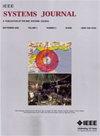Multi-UAV-Assisted Offloading for Joint Optimization of Energy Consumption and Latency in Mobile Edge Computing
IF 4
3区 计算机科学
Q1 COMPUTER SCIENCE, INFORMATION SYSTEMS
引用次数: 0
Abstract
To address the performance limitations caused by the insufficient computing capacity and energy of edge internet of things devices (IoTDs), we proposed a multi-unmanned aerial vehicles (UAV)-assisted mobile edge computing (MEC) application framework in this article. In this framework, UAVs equipped with high-performance computing devices act as aerial servers deployed in the target area to support data offloading and task computing for IoTDs. We formulated an optimization problem to jointly optimize the connection scheduling, computing resource allocation, and UAVs' flying trajectories, considering the device offloading priority, to achieve a joint optimization of energy consumption and latency for all IoTDs during a given time period. Subsequently, to address this problem, we employed deep reinforcement learning for dynamic trajectory planning, supplemented by optimization theory and heuristic algorithm based on matching theory to assist in solving connection scheduling and computing resource allocation. To evaluate the performance of proposed algorithm, we compared it with deep deterministic policy gradient, particle swarm optimization, random moving, and local execution schemes. Simulation results demonstrated that the multi-UAV-assisted MEC significantly reduces the computing cost of IoTDs. Moreover, our proposed solution exhibited effectiveness in terms of convergence and optimization of computing costs compared to other benchmark schemes.多无人机辅助卸载,联合优化移动边缘计算的能耗和延迟
为解决边缘物联网设备(IoTD)计算能力和能源不足所造成的性能限制,我们在本文中提出了一种多无人机辅助移动边缘计算(MEC)应用框架。在该框架中,配备高性能计算设备的无人机充当部署在目标区域的空中服务器,为物联网设备的数据卸载和任务计算提供支持。我们提出了一个优化问题,即在考虑设备卸载优先级的情况下,联合优化连接调度、计算资源分配和无人机飞行轨迹,以实现给定时间段内所有物联网终端的能耗和延迟的联合优化。随后,针对这一问题,我们采用深度强化学习进行动态轨迹规划,并辅以优化理论和基于匹配理论的启发式算法来辅助解决连接调度和计算资源分配问题。为了评估所提算法的性能,我们将其与深度确定性策略梯度、粒子群优化、随机移动和局部执行方案进行了比较。仿真结果表明,多无人机辅助 MEC 大幅降低了 IoTD 的计算成本。此外,与其他基准方案相比,我们提出的解决方案在收敛性和计算成本优化方面表现出了有效性。
本文章由计算机程序翻译,如有差异,请以英文原文为准。
求助全文
约1分钟内获得全文
求助全文
来源期刊

IEEE Systems Journal
工程技术-电信学
CiteScore
9.80
自引率
6.80%
发文量
572
审稿时长
4.9 months
期刊介绍:
This publication provides a systems-level, focused forum for application-oriented manuscripts that address complex systems and system-of-systems of national and global significance. It intends to encourage and facilitate cooperation and interaction among IEEE Societies with systems-level and systems engineering interest, and to attract non-IEEE contributors and readers from around the globe. Our IEEE Systems Council job is to address issues in new ways that are not solvable in the domains of the existing IEEE or other societies or global organizations. These problems do not fit within traditional hierarchical boundaries. For example, disaster response such as that triggered by Hurricane Katrina, tsunamis, or current volcanic eruptions is not solvable by pure engineering solutions. We need to think about changing and enlarging the paradigm to include systems issues.
 求助内容:
求助内容: 应助结果提醒方式:
应助结果提醒方式:


